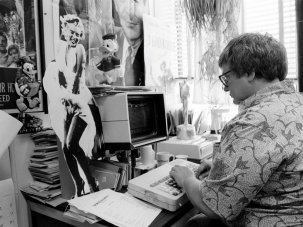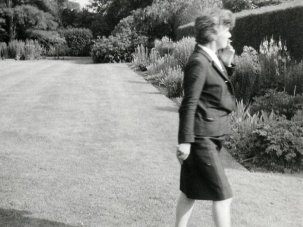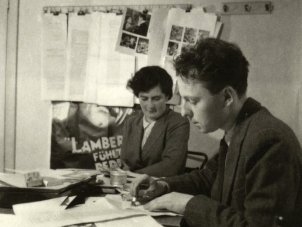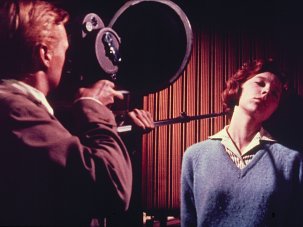Web exclusive
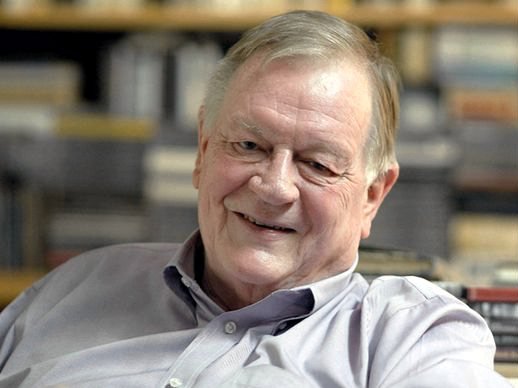
Richard Schickel
Credit: Milwaukee Sentinel Journal
Dick Schickel was the pro, and the reliable hack movies deserved. He was the Roscoe Karns character in the newsroom gang from His Girl Friday. I do not use the word ‘hack’ with any distaste; it’s a badge of honour and I heard him use it on himself a few times. It meant that he reckoned movies required expertise, experience and a wry literacy that disdained drawing attention to those qualities. He was a patient contemporary of alleged personality critics, and he could be amusing and caustic about any culture tempted into the absurd self-esteem of star movie authorities.
So Dick wrote to assignment, to word count, on deadline, for close to 60 years. And he was very good. He understood that there was a time when American movies meant a great deal, naturally (without strain or pretension or academic pomp). They were as vital as great songs or double-headers that went to extra innings. Yet still they weren’t worth more than a hill of beans or a few hundred words.
Dick was born in Wauwatosa, Wisconsin (near Milwaukee) in 1933, which means that he was ten when Casablanca opened. Nineteen forty-three was not the safest year for everyone within range of a projector’s light (and Dick’s sense of life never forgot such outliers), but he knew how lucky he was to be such a boy. He acted sour in life (I would guess from an early age), but in part that was because he was shy of showing how secretly elated he was at being paid to go into the dark and turn a couple of hours into five paragraphs. Without that, he might have had to work.
He spent much of his career at Time, sharing the film critic post there with Richard Corliss. I knew both men quite well, and I loved Corliss, so it’s worth saying that the two Richards never got into the frantic rivalry of some paired critics at, say, the New Yorker. They knew there was enough to go round, and they appreciated each other’s ability to slip wit, character and nifty journalism past the Time formula.
Schickel was relaxed in his bearing, and unashamed of seeming grouchy and cantankerous sometimes. I think he kept those strategies as a warning to wide-eyed careerist film writers soaring on some PhD theory or on their own obscure brilliance. Dick knew how films were made and that is how he earned the trust of veterans like Clint Eastwood, Sam Fuller and Scorsese who were willing to have him say, casually, that what they did might sometimes be art. He had the attitude of a sports writer, which knew that what Willie Mays or George Best had done last night amounted to majesty and beauty, but just wait for them to screw up tonight.
He wrote a lot, as if it kept him alive. He did outstanding tribute documentaries – just look at the films on Warner Brothers and Chaplin. In the early 1970s, he had pioneered the attempt to let veterans speak in a TV series, The Men Who Made the Movies, for Public Broadcasting. You can say those films were too admiring and uncritical, but no one had foreseen that kind of oral history before. His DVD commentaries were always helpful. He reckoned that a good critic helped you not waste time.
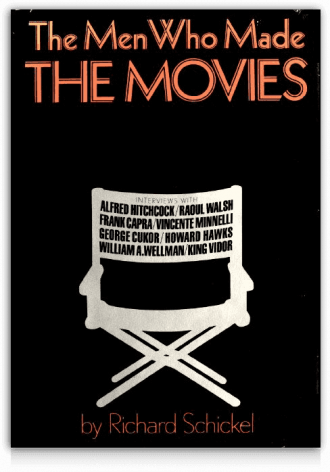
He wrote a lot of books and he would admit that some were chores. But his life of D.W. Griffith (1984) is still the best thing written on that self-destructive master. Intimate Strangers (1985) introduced ideas on celebrity, but in an offhand way that said, weren’t the ideas obvious? Good Morning, Mr Zip Zip Zip (2003) is a classic memoir on being a World War II kid and thinking the movies were a heaven to save us all. And his last book, Keepers, is a loose collection of some of his best writing, founded on this dry faith: that most movies were silly, or worse, so that “There are people who are impervious to them, of course. I am clearly not one of them… I expect, in fact, to be going to a movie the day before I die. Why not? They are a harmless addiction. Except when they are not; then they are instructive in ways that can be wondrous. I am grateful to them – let’s leave it at that.”
Of course, he outlived his time: dead at 84, he was one of the last survivors of those New York screening rooms where the wildly varied best of the 1960s and the 70s met an opinionated, show-off audience rehearsing its snappy one-liners before a film ended. Well before Dick’s departure, the medium had given up on his kind of adroit account of the screen’s bliss. The democracy of film blogging (et cetera) may be laudable or our new natural. But it has not always been good for professionalism, for writing spurred by editing, for auteur modesty, and the art of getting 5,000 words down to 500.
Dick was not ingratiating. He could take and give offense. He and I fell into a silence for a time, and I regretted it even if I went through a high-minded year or two of feeling he had got too close to Mr Eastwood. Then one evening, emerging into the twilight glow after a screening at Paramount in Los Angeles – I think it was The Truman Show – I saw his hunched figure ahead of me, and I called out to him. In about three minutes we were friends again, and we went off to dinner. We both admired The Truman Show, but we didn’t talk about that too much. We kept our occasion for life, children, friends, enemies, and the meal. As Dick must have said, it was a sad time when film critics persuaded themselves that film was the most important thing in the world.
Watch Richard Schickell with Richard Corliss discuss Schickel’s book of interviews with Martin Scorsese
-
The Digital Edition and Archive quick link
Log in here to your digital edition and archive subscription, take a look at the packages on offer and buy a subscription.




